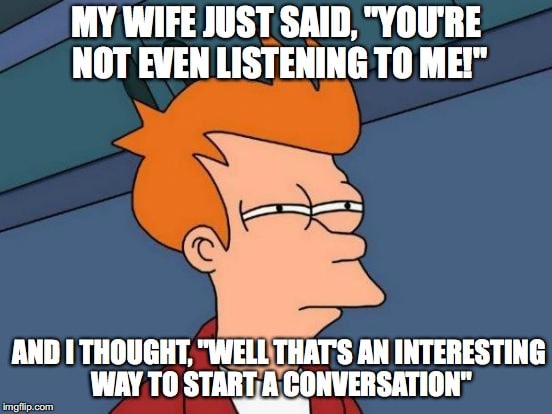‘Are you listening to me?’ The quality of your relationships depend on listening skills
By Kate Murphy
“You’re not listening!” “Let me finish!” “That’s not what I said!” After “I love you,” these are among the most common refrains in close relationships. During my two years researching a book on listening, I learned something incredibly ironic about interpersonal communication: The closer we feel toward someone, the less likely we are to listen carefully to them. It’s called the closeness-communication bias and, over time, it can strain, and even end, relationships.
Once you know people well enough to feel close, there’s an unconscious tendency to tune them out because you think you already know what they are going to say. It’s kind of like when you’ve traveled a certain route several times and no longer notice signposts and scenery.
But people are always changing. The sum of daily interactions and activities continually shapes us, so none of us are the same as we were last month, last week or even yesterday.
 The closeness-communication bias is at work when romantic partners feel they don’t know each other anymore or when parents discover their children are up to things they never imagined.
The closeness-communication bias is at work when romantic partners feel they don’t know each other anymore or when parents discover their children are up to things they never imagined.
It can occur even when two people spend all their time together and have many of the same experiences.
Kaleena Goldsworthy, 33, told me it was a shock when her identical twin, Kayleigh, decided to move to New York City 10 years ago to pursue a career in music. Kaleena, now the owner of a company that makes cocktail bitters in Chattanooga, Tenn., said she and her twin had previously been inseparable. They had spent most of their lives sleeping in the same room, going to the same schools, attending the same parties, competing in the same sports, and playing in the same band.
“When my sister moved, we were forced to recognize we had all these preconceived notions about who the other was,” Ms. Goldsworthy said. “We weren’t really listening to each other, which made it harder for us to really know each other.”
Social science researchers have repeatedly demonstrated the closeness-communication bias in experimental setups where they paired subjects first with friends or spouses and then with strangers. In each scenario, the researchers asked subjects to interpret what their partners were saying. While the subjects predicted they would more accurately understand, and be understood by, those with whom they had close relationships, they often understood them no better than strangers, and often worse.
“Accurately understanding another person often requires a second thought, to think, ‘Wait a minute, is this really what this person meant?’ and to check it,” said Nicholas Epley, a professor of behavioral science at the University of Chicago Booth School of Business who studies the closeness-communication bias. “We just don’t do that as much with those we are close to because we assume we know what they are saying and that they know what we are saying.”
A prime example, he said, was when he gave his wife what he thought was the perfect gift: a behind-the-scenes tour of the Shedd Aquarium in Chicago, during which she would get to feed the dolphins, beluga whales and penguins. He thought she’d love it because she’d once expressed interest in swimming with dolphins. But she didn’t love it. At all. She was annoyed because she was pregnant at the time and suffering from morning sickness. Just the thought of touching a dead fish made her want to vomit.
“I didn’t stop to think, ’Is this the right gift given where my wife is now in her life?’ I hadn’t really been listening well enough to know where she was,”
Dr. Epley said. “We all develop stereotypes of the people we know well, and those stereotypes lead us to make mistakes.” Now he said he asks his wife for a list of gifts she wants.
The closeness-communication bias not only keeps us from listening to those we love, it can also keep us from allowing our loved ones to listen to us. It may explain why people in close relationships sometimes withhold information or keep secrets from one another.
In an in-depth study of 38 graduate students, confirmed in a larger online survey of 2,000 people representative of all Americans, the Harvard sociologist Mario Luis Small found that slightly more than half the time, people confided their most pressing and worrisome concerns to people with whom they had weaker ties, even people they encountered by chance, rather than to those they had previously said were closest to them — like a spouse, family member or dear friend. In some cases, the subjects actively avoided telling the people in their innermost circle because they feared judgment, insensitivity or drama.
 You’ve probably experienced this phenomenon when someone close to you revealed something that you didn’t know while the two of you were talking to someone else. You might have even said, “I didn’t know that!”
You’ve probably experienced this phenomenon when someone close to you revealed something that you didn’t know while the two of you were talking to someone else. You might have even said, “I didn’t know that!”
The revelation most likely occurred because the additional person was listening differently than you previously had. Maybe that person showed more interest, asked the right questions, was less judging or was less apt to interrupt. Again, it’s not that people in close relationships are purposefully neglectful or inattentive, it’s simply human nature to become complacent about what we know.
So what can you do about it? The British anthropologist and evolutionary psychologist Robin Dunbar said the primary way to maintain close relationships is through “everyday talk.” That means asking, “How are you?” and actually listening to the answer.
Too often spouses, and also parents with their children, reduce conversations to logistics such as what to have for dinner, whose turn it is to do the laundry, or when to leave for soccer practice. Friends might run down their latest accomplishments and activities. What often gets left out is what is really on people’s minds — their joys, struggles, hopes and fears. Sometimes people keep conversation light with friends and family because they assume they already know what’s going on, but also, they may be afraid of what they might learn.
But what is love if not a willingness to listen to and be a part of another person’s evolving story? A lack of listening is a primary contributor to feelings of loneliness.
In a 2018 survey of 20,000 Americans, almost half said they did not have meaningful in-person social interactions, such as having an extended conversation with a friend, on a daily basis. About the same proportion said they often felt isolated and left out even when others were around.
Of course, technology doesn’t help. Devices are a constant distraction, and people tend to be woefully inaccurate at interpreting feeling states through text and emoji. What exactly does a smiley face with its tongue sticking out mean?
“Technology magnifies the closeness-communication bias because you have less information to work with,” said Dr. Epley, referring to the brevity of texts and absence of cues like tone of voice and body language.
It turns out the best way for us to really understand those closest to us is to spend time with them, put down our phones and actually listen to what they have to say.
__________________
Kate Murphy is the author of “You’re Not Listening: What You’re Missing and Why It Matters.”




















